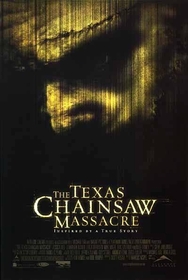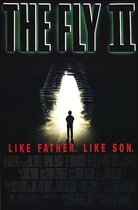Our editor-in-chief Nate Yapp is proud to have contributed to the new book Hidden Horror: A Celebration of 101 Underrated and Overlooked Fright Flicks, edited by Aaron Christensen. Another contributors include Anthony Timpone, B.J. Colangelo, Dave Alexander, Classic-Horror.com's own Robert C. Ring and John W. Bowen. Pick up a copy today from Amazon.com!
The Texas Chainsaw Massacre (2003)
I don't know what kind of hive mind Hollywood taps into, but 2003 saw the release of at least three prominent horror films with the same basic plotlines - kids on a road trip run into crazy kin intent on wholesale slaughter. Not entirely original, especially given that all three films (House of 1000 Corpses, Wrong Turn, and The Texas Chainsaw Massacre '03) not only bore similarities to each other, but the trio also brandished their 1970s "relentless terror" influences on their sleeves.
Of these films, TCM '03 is the only direct remake. As in Tobe Hooper's 1974 original, a van's worth of free-lovin' hippie kids are trekking across the Texas landscape. The group picks up a hitchhiker on a desolate road in the all-too-common middle of nowhere. The new arrival commits a bizarre act of violence that sets off a lethal cycle of brutality and mayhem.
Too often, remakes and homages are made with an abundant enthusiasm for the source material, but not enough understanding of why the older films worked (House of 1000 Corpses, though fairly entertaining, is particularly guilty of this). TCM remake screenwriter Scott Kosar crafted his adaptation with both heart and intelligence, keeping the basics of the plot and the original subtext basically intact. From there, he crafted a fresh account with new characters doing the same things for different reasons.
In fact, TCM '03 avoids the most prevalent sin of the modern horror remake - being completely unnecessary (see Psycho '98, The Haunting '99, and Thirteen Ghosts '01). It not only refers to the original in a few neat little touches (both visual and verbal), but implicitly acknowledges its co-existence. The opening narration (done in both versions by John Larroquette) is similar in both movies, but much after that, the remake begins to diverge. The direction and acting is heightened in the way that modern Hollywood filmmaking demands (compared to the naturalistic cinema verité feel of the 1974 film). One could take the 2003 movie as the modern, docudrama-cum-horror flick dramatization of Hooper's movie, which presents the events as they actually took place (though, obviously, both films are still fiction, and this scenario would require being some serious meta-tastic fanwankery).
It's kind of cool, really, whether it was the filmmaker's intent or not, and actually serves to a new dimension to the TCM mythos (one can expect the remake's upcoming sequel to completely miss the point - I'm open-minded, not naïve).
However, the "heightened" direction occasionally presents an obstacle to full enjoyment. Marcus Nispel, who previously helmed music videos for No Doubt and the Fugees, is interested in using the sticky and rotting Texas locations as a smooth segue into sheer grue as an element of terror. Much of the time it works, but there are some trick shots used to examine the grotesqueries. Instead of being impressive, this fancy camera work impugns on the suspension of disbelief; the momentum, intended to be unrelenting, lets off a bit. I specifically refer to a journey taken from within a gunshot wound - it's unnecessary and jarring in all the wrong ways.
Likewise, the film loses a bit of steam during a detour into a trailer home. This sequence is supposed to demonstrate the sheer hopelessness of the situation, but after an hour or so of pretty nihilism, such a move is rather redundant. The extent, then, of its effect is to awkwardly introduce an unnecessary plot element.
The actors are uniformly acceptable - nothing especially brilliant about their work, but nothing that detracts, really. The kids are a bit too fresh-faced and the family too stereotypically weird ("surprise" members of the clan are met with knowing yawns). The execution of the film's purpose, however, lies in the art direction and editing (which are both pretty good), so the strengths and weaknesses of the actors' contributions are somewhat diminished.
Possibly the best way to go into The Texas Chainsaw Massacre '03 is with low expectations and an open mind. With a viewpoint like this, it's much easier to let this extremely enjoyable and often thrilling flick surprise you. Give it a shot; you won't regret it.








